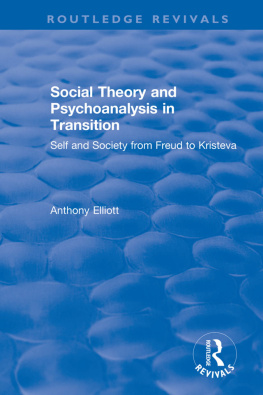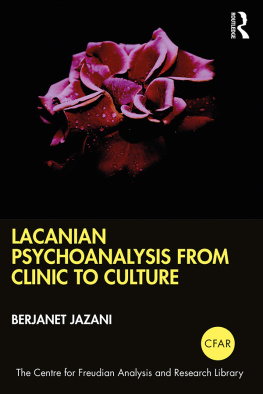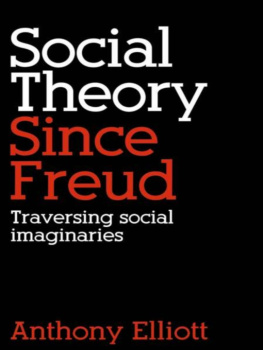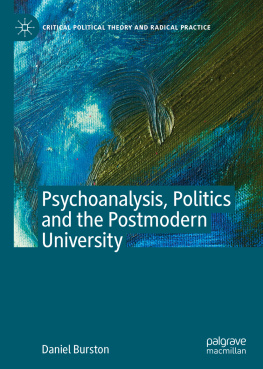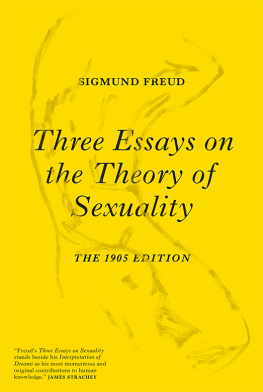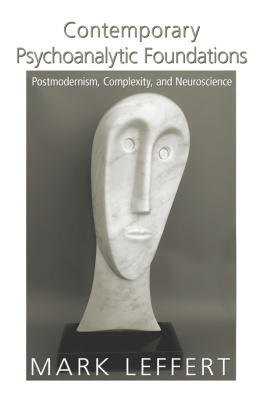Routledge Revivals
Psychoanalysis at its Limits
Has psychoanalysis become postmodern? How are the various schools of psychoanalysis being altered by postmodernism? What role does psychoanalysis have to play in the cultural debate in postmodern times? Originally published in 2000, Psychoanalysis at its Limits offers a stimulating account of the complex and contradictory nature of psychoanalysis in the postmodern age. It presents a history and critique of the concept of postmodernism throughout contemporary psychoanalytic thought. As such it is a critical survey of the complex relations between desire, selfhood and culture.
Psychoanalysis at its Limits
Navigating the Postmodern Turn
Edited by Anthony Elliott and Charles Spezzano
First published in 2000
by Free Association Books Limited
This edition first published in 2018 by Routledge
2 Park Square, Milton Park, Abingdon, Oxon, OX14 4RN
and by Routledge
711 Third Avenue, New York, NY 10017
Routledge is an imprint of the Taylor & Francis Group, an informa business
2000 Anthony Elliott and Charles Spezzano
All rights reserved. No part of this book may be reprinted or reproduced or utilised in any form or by any electronic, mechanical, or other means, now known or hereafter invented, including photocopying and recording, or in any information storage or retrieval system, without permission in writing from the publishers.
Publisher's Note
The publisher has gone to great lengths to ensure the quality of this reprint but points out that some imperfections in the original copies may be apparent.
Disclaimer
The publisher has made every effort to trace copyright holders and welcomes correspondence from those they have been unable to contact.
A Library of Congress record exists under LCCN: 00268904
ISBN 13: 978-1-138-35374-9 (hbk)
ISBN 13: 978-0-429-42522-6 (ebk)
ISBN 13: 978-1-138-35377-0 (pbk)
PSYCHOANALYSIS AT ITS LIMITS
PSYCHOANALYSIS AT ITS LIMITS
NAVIGATING THE POSTMODERN TURN
Edited by
Anthony Elliott
and Charles Spezzano
First published 2000 in Great Britain by
Free Association Books Limited
57 Warren Street, London W1P 5PA
Copyright Anthony Elliott and Charles Spezzano 2000
The right of Anthony Elliott and Charles Spezzano to be identified as the authors of this work has been asserted by them in accordance with the Copyright, Designs and Patents Act 1988.
ISBN 1 85343 464 7 hbk; 1 85343 465 5 pbk
A CIP catalogue record for this book is available from the British Library
Designed and produced for Free Association Books Ltd by Chase Production Services, Chadlington, OX73LN
The idea for this book arose out of a collaborative research effort. It was some years ago that we uncovered important emerging connections between psychoanalysis and postmodernism. The article which resulted from our research, 'Psychoanalysis at its Limits: Navigating the Postmodern Turn', unleashed dialogue and debate between various schools of the discipline; since then, many people encouraged us to extend our work in this area by putting a book together comprising academics and psychoanalysts, in order to consider the changing configurations of psychoanalysis, postmodernism and contemporary theory.
There are several individuals that we must thank at the outset. We are grateful to David Stonestreet at Free Association Books for supporting the project and providing helpful advice throughout. In the early planning stages, Michael Moskowitz offered constructive encouragement; also Ed Rawlings offered much steadfast help in assembling the manuscript. We owe a particular debt to Anthony Moran, who assisted with the final stages of editing and played a crucial role in turning the manuscript into a book. Finally we are grateful to the contributors for responding to our many queries, and for providing essential links between psychoanalysis and postmodernism in the material analysed and debated in this book.
We are grateful to the following publishers for their permission to republish some of the material in this collection:
Anthony Elliott and Charles Spezzano, 'Psychoanalysis at its Limits: Navigating the Postmodern Turn', The Psychoanalytic Quarterly , 1996, Vol. LXV, No. 1: 52-83. Reprinted in O. Renik (ed.), Knowledge and Authority in the Psychoanalytic Relationship , Northvale, NJ: Aronson, 1998: 59-92.
Jane Flax, 'Final Analysis: Can Psychoanalysis Survive in the Postmodern West?', in her Disputed Subjects , New York: Routledge, 1993.
Stephen Frosh, 'Postmodernism and the Adoption of Identity', adapted from themes developed in his For and Against Psychoanalysis, London: Routledge, 1998.
Jessica Benjamin, 'The Shadow of the Other Subject: Intersubjectivity and Feminist Theory', from her Shadow of the Other , New York: Routledge, 1998.
Thomas Ogden, 'The Dialectically Constituted/Decentred Subject of Psychoanalysis I and II', The International Journal of Psycho-Analysis , Vol. 73: 517-26 and Vol. 74: 613-26. Copyright Institute of Psycho-Analysis.
Anthony Elliott, 'The Ambivalence of Identity', slightly revised version of chapter from his Subject to Ourselves: Social Theory, Psychoanalysis and Postmodemity , Cambridge: Polity Press, 1996.
Charles Spezzano, 'The Struggle to Imagine', slightly revised version of chapter from his Affect in Psychoanalysis , Hillsdale, NJ: The Analytic Press, 1993.
Anthony Elliott and Charles Spezzano
Melbourne and San Francisco
April 1999
Anthony Elliott and Charles Spezzano
The portrait of psychoanalysis developed in this book circles around multiplicity, pluralism and ambivalence. This is not only, as one might expect, because of the diversity of contributions contained in the volume; and nor is it simply a consequence of reflecting upon the Freudian understanding of human subjectivity as passionate, fractured and divided. Rather it is because the key issues of modernity and postmodernity are riddled with ambiguity and controversy, and demand the rediscovery of psychoanalysis itself.
The postmodern in psychoanalysis, as in other discourses, involves second-order reflections upon the limits and limitations of the modern project of making the unconscious conscious, putting the ego where the id was, or simply helping the patient to become more reasonably passionate. The postmodern edge of psychoanalysis takes issue with modern reason and its consequences; it questions and deconstructs the ideas, assumptions and objectives which derived into psychoanalysis from the Enlightenment. The postmodern is modern psychoanalytic practice coming to terms with itself, pushing its ideological and moral beliefs to the limit, all in an attempt to think the unthinkable.
Some theorists, analysts and therapists have heard such notions as arguments that everything about psychoanalysis as they have known it is over - that to allow postmodern ingredients into the psychoanalytic stew is to stop trying to create better understandings of psyche or better images and accounts of insight, healing and transformation. We take issue with this. Following the French philosopher, Jean-Franfois Lyotard, we argue that the notion of the postmodern should not be understood as implying sequentially, that is, as an epoch which comes after modernity. All attempts to play the postmodern off against the modern and to assign these epochs historical periodization, according to Lyotard, must fail. For we have not taken leave of the modern. Instead, the problem of postmodernism is that of an intensely critical relationship with the modern which is coming into view everywhere - for example, in our responses to technology, the environment, the family, gender relations, identity and personhood. This viewpoint is also strongly endorsed by the cultural theorist Zygmunt Bauman. 'Postmodernity', writes Bauman (1990: 272), 'does not necessarily mean the end, the discreditation or the rejection of modernity. Postmodernity is no more (but no less either) than the modern mind taking a long, attentive and sober look at itself, at its conditions and its past works, not fully liking what it sees and sensing the urge to change.'


